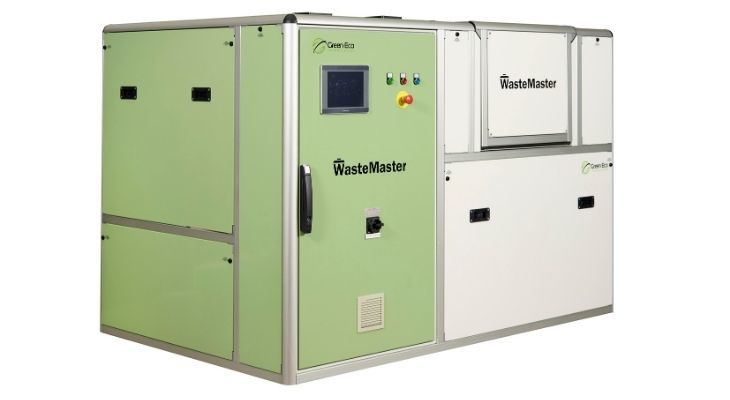WasteMaster converts and recycles organic waste as a beneficial resource
Addressing both the extremely damaging effect that organic waste has on the environment, and the seemingly unrestrained wastage of valuable resources such as water, Green Eco Technologies (GET) has developed an innovative and sustainable organic waste processing system, the WasteMaster, to tackle these global problems.
The WasteMaster system takes positive action to prevent damaging emissions, efficiently converting food waste on site, and recovering the maximum benefit from this resource, without using precious water or other additives during the process. Harnessing a unique technology which cleanly accelerates food waste decomposition, the WasteMaster reduces the weight of the organic waste loaded by up to 80 per cent leaving a much smaller quantity of virtually odour-free, compost-like residual material at the end of the process.
This residue retains the original calorific value of the organic waste and can be re-purposed to produce green energy through anaerobic digestion or to create a high-quality fertiliser/compost. Through the use of the WasteMaster, organic waste is diverted from landfill thereby reducing greenhouse gas emissions, and GET is working with research bodies and universities to identify new uses for the residual material to both maximise the re-use benefits and to support a circular economy.
From a global sustainability perspective, WasteMaster operation supports the United Nations’ Sustainable Development Goals – especially those relating to Affordable and Clean Energy, Sustainable Cities and Communities and Innovation. The WasteMaster is also taking positive climate action by tackling organic waste as one of the largest emitters of methane. Research conducted by Deakin University has found that the WasteMaster conversion process delivers an 84% CO2 equivalent reduction when compared to sending organic waste to landfill.
On-site food waste conversion suits many environments including multi-unit developments (MUDS) where space is at a premium, rotting food waste storage creates odour problems and attracts vermin, and frequent collection vehicle movements have a harmful effect on air quality as well as site safety. The WasteMaster process efficiently reduces and transforms unavoidable food waste into a pathogen-free, high calorific-value, reusable residual product, which is easily stored on site until it is transported for its next life.
Requiring only a three-phase power supply and an air outlet and operated just with a single button, the WasteMaster is monitored remotely to ensure trouble-free operation and offloads automatically at the end of the conversion process. The system’s diagnostics also measure the actual weight of the organic waste being processed for sustainability reporting and to support waste minimisation training programmes and initiatives.
To date the WasteMaster has diverted over 1.2 million kgs of organic waste from landfill globally from installations including multi-user developments, hospitals, hotels, schools, leisure complexes, shopping centres, and produce markets, in Australia, France, the United States, Chile, the UAE and the UK.
The use of the WasteMaster has also changed behaviour, with operators reportedly becoming more aware of the importance of minimising waste in the first instance and segregating food waste from general waste to maximise recycling potential.
Epworth HealthCare, the largest not-for-profit private hospital group in Victoria, uses a WasteMaster to process its organic waste at its hospital in Richmond, Victoria. With sustainability at the core of the Group’s strategic plan, the WasteMaster’s recycling of organic waste to produce green energy, while also reducing its carbon emissions, made it a perfect fit. Organic waste had previously been either sent to landfill or flushed into a waste masceration system, using large amounts of water.
A WasteMaster was installed in February 2020, and has diverted nearly 32 tonnes of food waste from landfill, with the remaining residue left after conversion being sent to Yarra Valley Water Anaerobic Digestion facility, generating enough electricity to power up to 1500 homes for a day.

The WasteMaster at Epworth Hospital
Visit www.greenecotec.com or email [email protected] for more information about the WasteMaster system.
-
Subscribe to the latest industry news, insights and AWRE updates.
- Subscribe

